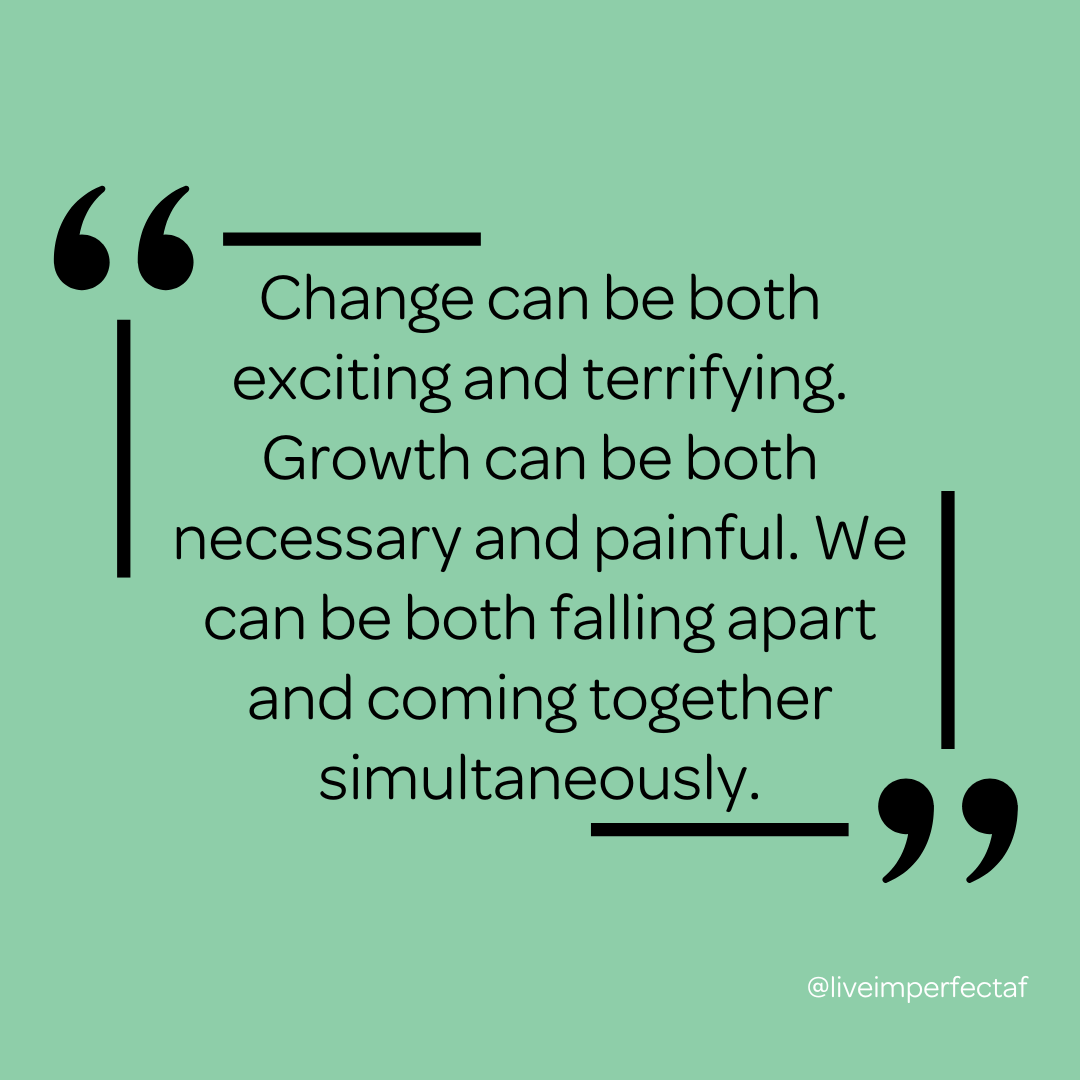A Holistic Wellness Coach's Personal Toolkit for Life Transitions: Part 3 - Sustaining the Journey
Some days I feel grounded. Some days I'm a disaster. Most days I'm somewhere in between.
This month, I’ve been sharing my personal toolkit for navigating major life decisions, changes, transitions, and all those sticky messy middles. Part 1 explored the internal foundation: acknowledgment, laying it all out, and timeline reality checks. Part 2 looked at some of my practical actions: externalizing emotions, creating enough space, and protecting energy.
These are tools that have been proven to help me. Sometimes I forget, resist their support, or use them in other imperfect ways. But when I do remember and allow them to offer support, I can see and feel the difference.
As I'm writing this final part, I'm still very much in my own messy middle. These transitions are touching multiple areas of my wellness from physical exhaustion, emotional overwhelm, the intellectual challenge of redefining my professional work, and even how I move through my environment. As a holistic wellness coach, I know change ripples through every dimension of my wellness. And that's what makes it so consuming.
Some days I use these tools well. Other days I completely forget them or my emotions take over. I'm learning in real-time that having a toolkit is different from being done with the journey or having it all perfected and figured out. And sometimes, even with all the practices I can do on my own, I need more than what I can provide myself.
So this final part is about the stuff we don't always discuss: how to celebrate progress you can barely see, how to trust a timeline when you have no idea where it's leading, and when to recognize that you need more support than your personal toolkit can provide. These aren't just nice-to-knows — they're the difference between simply surviving change and actually moving through it.
Sustaining the Journey
The practices and actions from both part 1 and part 2 give me a lot of support. They really do. But I've also learned that internal work and external actions aren't always enough.
Sometimes I need to remember that the tiny step I took today counts as progress. Sometimes I need to surrender to not knowing the timeline. And sometimes I need to admit I can't do this alone.
The three anchors below are what help me when the toolkit isn't quite enough on its own.
Celebrate Tiny Wins
When it comes to messy life transitions, especially ones with uncertainty in the process or outcome, progress doesn't look like we think it should. There are twists and turns. Setbacks. Complications. The path is rarely a straight line forward.
I'm a believer in celebrating tiny wins all the time. Yes, it's me over here occasionally adding “step outside” to my to-do list so I don’t lose myself in the day and forget to take a moment for myself. For me, having moments to acknowledge I did something—anything—helps my emotional wellness. These small recognitions become even more important when the road is murky and messy.
Why does this matter? Our brain's reward system activates each time we celebrate and recognize success. Research has shown that setting smaller achievable milestones helps with stress and anxiety management. The reward center releases dopamine, which boosts self-esteem and motivation. Celebrating wins, even tiny ones, creates a positive cycle.
During transitions, you might not have concrete milestones to celebrate. Wins can appear in any area of your life: looking at your budget today, having a spiritual practice moment, getting some movement in, having one necessary conversation, or simply keeping your environment from falling apart completely. Maybe you're navigating next steps after a layoff, or treatment for a medical condition. You might not know what the end looks like or be able to plan traditional milestones. But maybe one day you create some space to update your resume. Or you have a morning where medication doesn't make you nauseous. Celebrate those.
I like to have a sweet snack I enjoy, buy myself a new sticker or journal, or take a moment to just relax. Lately, I’ve been using an app called Finch that helps me track daily self-care and celebrate tiny accomplishments without judgment. The method matters less than the acknowledgment.
What this looks like in practice:
Naming one thing at the end of the day that made you smile
Keeping a wins list—no item is too small
Tiny rewards for tiny wins: a piece of candy, a bougie latte, staying in those oh so cozy clothes all day
Not every day will have obvious wins. Some days "I got out of bed" counts. Some days "I didn't make things worse" is the victory. That's okay. That's enough.
Trust the Timeline You Can’t See
One of the hardest parts of big transitions is not having all the answers. Sometimes it feels like walking into an abyss—unable to imagine what the other side will look or feel like. Other times, the destination is visible but the path there is covered in quicksand. How long will it take? How difficult will it be? Completely unknown.
As someone whose brain defaults to worst-case scenarios in moments of uncertainty, trust in the process doesn't come naturally to me. But trying to plan every detail and control the outcome wastes the energy you don't have to spare (remember those invisible energy vampires from Part 2?) and causes more harm than comfort. So much of this is outside of our control.
The discomfort of not knowing is normal. And that discomfort may show up everywhere—physically (tension, fatigue), emotionally (anxiety, grief), relationally (pulling away or clinging), financially (uncertainty about resources), intellectually (working becomes difficult), spiritually (questioning meaning), and in your environment (nothing feels like home). Making space for those, as discussed in Part 2, is essential. But surrendering to the unknown while holding close what I can control? That actually helps calm the chaos, and is equally essential.
This doesn't mean letting timelines drag out forever or being passive. It means acknowledging that your path probably has the switchbacks of a steep hike. For me, focusing on how the other side might feel, and what could be possible beyond it, helps more than trying to force certainty where there isn't any.
What this looks like in practice:
Practicing, and even saying, "I don't know” out loud
Shifting from worst-case to best-case scenarios (or at least neutral ones)
Writing down the facts you DO know
Asking yourself: "What's the immediate next step” instead of focusing on steps farther ahead you cannot take action on yet
Surrendering to what I can't control and holding close what I can has become its own kind of ground beneath my feet.
When to Seek Additional Support
Asking for help isn't a sign that your toolkit failed. It's a sign that you're human.
We're communal by nature, but modern society has trained us to value independence as strength. Asking for help can feel like weakness. Research from Stanford found that we vastly underestimate how willing people are to help and how positive they feel afterward. We assume we're burdening them. Usually, we're wrong.
One thing that helps me when I need support is asking directly for what I need. When someone says “let me know if you need anything,” I've learned to actually tell them. “Can you check in on me this week?” or “Can you help with [specific task]?” Clear, specific asks make it easier for people to actually show up.
Sometimes, though, you need more than your inner circle can provide. Sometimes you need professional support, and recognizing that is wisdom, not weakness.
I'm not a medical professional and can't diagnose or advise on health concerns. But these signs have shown up in my life when I've needed to reach beyond my toolkit:
My tools aren't helping and distress isn't decreasing
Changes in sleep, appetite, or physical health that concern me
Emotions feel too big to process alone
I’m stuck in patterns despite trying to change
I’m isolating more than usual
I have a gut feeling I need more support
The transition is triggering past trauma
If several of these resonate, trust that instinct. Reaching out isn't giving up; it’s actually one of the bravest things you can do.
Support can look like:
A therapist (for processing trauma, anxiety, deep emotional work)
A coach (for navigating transitions, strategy, accountability)
A support group (community with others in similar situations)
A medical professional (for physical symptoms or medication needs)
Crisis resources (988 in the US for immediate mental health support)
What this looks like in practice:
Asking trusted people for referrals
Starting with one conversation—a consultation or discovery call
Joining a support group (online or in-person)
Calling a crisis line (no situation is too small)
I've sought support multiple times—therapy, coaching, medical professionals. There have been seasons where my toolkit was enough, and seasons where I needed someone in my corner. Both are valid.
If you're wondering whether you need additional support, that wondering could be your answer.
Pause and Reflect
Before you continue, sit with these questions:
What tiny win can you celebrate from today (or this week)?
What would it feel like to truly trust your timeline? To not know and be okay with it?
What support might you need that you haven't asked for yet?
Grab your journal or just sit with these for a moment.
The path forward isn't always clear. That's okay.
The Work Continues
Over these three weeks, I've shared what's helping me navigate ongoing life changes:
Part 1 provided the internal foundation: acknowledging what's real, laying it all out, and timeline reality checks.
Part 2 explored practical actions: externalizing emotions, creating space, and protecting your energy.
Part 3 focused on sustaining the journey: celebrating tiny wins, trusting the unknown, and knowing when to ask for help.
Knowing about these tools and actually implementing them in your specific, messy, complicated life are two different things. Having the support of a guide, coach or other professional who can see what you can't—someone to hold space for both the struggle and the strength—makes all the difference.
Change can be both exciting and terrifying. Growth can be both necessary and painful. We can be both falling apart and coming together simultaneously.
Even as a holistic wellness coach, I don't have it all figured out. What works in one situation can be less helpful in another. It’s not about navigating change perfectly. But I practice what I teach (at least to the best of my ability in that moment), sometimes stumble through it, and keep choosing tools that support my wellbeing—especially when I don't feel like it.
My lived experience of navigating change—the stumbling, the learning, the imperfect practice—is what helps me support you in finding what actually works for your life, not what 'should' work. I’m over the shoulds.
I'm curious: What are a few practices you’d like to jot down for the next time you are navigating something difficult? Drop a comment or send me a message—I'd love to hear where you are.
Ready to navigate your life transition with support instead of struggling through it alone? I'd love to help you move through what you're facing with tools that actually fit your life. Because when you have someone holding space for both your struggle and your strength, the path forward becomes less uncomfortable.




